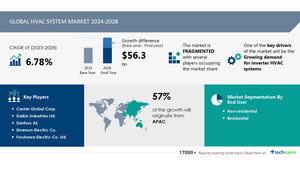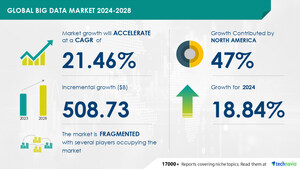NEW YORK, Jan. 31, 2024 /PRNewswire/ -- The hybrid electric marine propulsion engine market is estimated to grow by USD 1.13 billion from 2022 to 2027, according to Technavio. The market is estimated to grow at a CAGR of 5.2% during the forecast period. However, the growth momentum will progress. APAC is estimated to contribute 44% to the growth by 2027. In the APAC market, primary revenue sources include ferries, tugboats, and yachts. To comply with stringent regulations on emissions set by regulatory bodies, these vessels are increasingly adopting hybrid electric engines. Notably, ports like Taiwan and Hong Kong have implemented a maximum sulfur cap of 0.5% in vessel fuel sources since 2019, driving the demand for hybrid electric propulsion engines. Key countries such as China, Hong Kong, Taiwan, and Singapore are embracing this technology for their marine vessels, particularly for enhanced propulsion power. For more insights on the historical (2017 to 2021) and forecast market size (2023 to 2027) - Request a free sample report
Technavio has segmented the market based on Application (Commercial and Leisure ), End-user (Tugboats, Offshore support vehicles, Ferries, and Others ), and Geography (APAC, Europe, North America, Middle East and Africa, and South America).
- The market share growth by the commercial segment will be significant during the forecast period. The market encompasses diverse commercial marine vessels for transporting goods globally, including cargo ships and offshore support vessels. To mitigate emissions, stakeholders are exploring alternatives like hybrid electric engines, notably in vessels such as tugboats. The rising demand for energy resources, coupled with offshore exploration growth, drives the need for offshore support vessels, contributing to the increased adoption of hybrid electric marine propulsion engines.
Insights on the market contribution of various segments including country and region wise historic (2017 to 2021), and forecast market size (2023 to 2027) - Download a free sample Report
Stringent emission regulations are the key factor driving the growth. Marine propulsion engines primarily using diesel contribute to air pollutants, prompting regulatory measures. The International Convention for the Prevention of Pollution from Ships (MARPOL) mandates EPA certification for diesel engines on US-flagged ships. Compliance with regulations has spurred fuel quality improvements, encouraging the adoption of alternative fuels like LNG to reduce carbon footprint and operational costs for marine vessel operators.
- The increasing popularity of hybrid turbochargers for marine vessels is a major trend.
- The availability of substitutes and maintenance complexities is a significant challenge restricting growth.
Insights on Drivers, trends, & Challenges, historic period(2017 to 2021), and forecast period(2023 to 2027)- Request a free sample report!
Hybrid Marine Propulsion Engines Advantages
Hybrid electric marine propulsion engines offer significant advantages in the maritime industry, combining the efficiency of electric propulsion with the power of traditional engines. These systems use a combination of electric and conventional propulsion technologies to optimize fuel efficiency and reduce environmental impact. By integrating energy storage systems and advanced power management, hybrid electric propulsion engines can enhance the performance of marine vessels, reduce fuel consumption, and lower emissions. They are particularly beneficial for applications in shipbuilding, maritime transportation, and sustainable shipping. This technology represents a significant advancement in marine engineering, offering innovative solutions for the future of marine propulsion.
What are the key data covered in this Hybrid Electric Marine Propulsion Engine Market report?
- CAGR during the forecast period
- Detailed information on factors that will drive the growth between 2023 and 2027
- Precise estimation of the size and its contribution to the parent market
- Accurate predictions about upcoming trends and changes in consumer behavior
- Growth of the Hybrid Electric Marine Propulsion Engine industry across APAC, Europe, North America, Middle East and Africa, and South America
- A thorough analysis of the market's competitive landscape and detailed information about vendors
- Comprehensive analysis of factors that will challenge the growth of Hybrid Electric Marine Propulsion Engine companies
Technavio's SUBSCRIPTION platform
Related Reports:
The Marine Propulsion Engine Market size is estimated to grow by USD 1,536.38 million at a CAGR of 3.99% between 2022 and 2027.
The global gas engine market size is estimated to grow by USD 2,168.62 million between 2022 and 2027 accelerating at a CAGR of 6.32%.
ToC:
Executive Summary
Market Landscape
Market Sizing
Historic Sizes
Five Forces Analysis
Segmentation by Application
Segmentation by End-user
Segmentation by Geography
Customer Landscape
Geographic Landscape
Drivers, Challenges, & Trends
Company Landscape
Company Analysis
Appendix
About US
Technavio is a leading global technology research and advisory company. Their research and analysis focus on emerging trends and provide actionable insights to help businesses identify opportunities and develop effective strategies to optimize their positions. With over 500 specialized analysts, Technavio's report library consists of more than 17,000 reports and counting, covering 800 technologies, spanning across 50 countries. Their client base consists of enterprises of all sizes, including more than 100 Fortune 500 companies. This growing client base relies on Technavio's comprehensive coverage, extensive research, and actionable insights to identify opportunities in existing and potential areas and assess their competitive positions within changing scenarios.
Contact
Technavio Research
Jesse Maida
Media & Marketing Executive
US: +1 844 364 1100
UK: +44 203 893 3200
Email: [email protected]
Website: www.technavio.com
SOURCE Technavio

WANT YOUR COMPANY'S NEWS FEATURED ON PRNEWSWIRE.COM?
Newsrooms &
Influencers
Digital Media
Outlets
Journalists
Opted In






Share this article